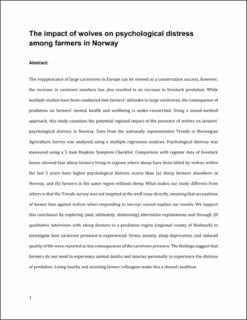| dc.contributor.author | Zahl-Thanem, Alexander | |
| dc.contributor.author | Burton, Rob J.F. | |
| dc.contributor.author | Blekesaune, Arild | |
| dc.contributor.author | Haugen, Marit S. | |
| dc.contributor.author | Rønningen, Katrina | |
| dc.date.accessioned | 2021-04-12T14:49:28Z | |
| dc.date.available | 2021-04-12T14:49:28Z | |
| dc.date.created | 2020-06-10T13:39:42Z | |
| dc.date.issued | 2020 | |
| dc.identifier.citation | Journal of Rural Studies. 2020, 78 1-11. | en_US |
| dc.identifier.issn | 0743-0167 | |
| dc.identifier.uri | https://hdl.handle.net/11250/2737388 | |
| dc.description.abstract | The reappearance of large carnivores in Europe can be viewed as a conservation success, however, the increase in carnivore numbers has also resulted in an increase in livestock predation. While multiple studies have been conducted into farmers’ attitudes to large carnivores, the consequence of predation on farmers’ mental health and wellbeing is under-researched. Using a mixed-method approach, this study examines the potential regional impact of the presence of wolves on farmers’ psychological distress in Norway. Data from the nationally representative Trends in Norwegian Agriculture Survey was analysed using a multiple regression analysis. Psychological distress was measured using a 5 item Hopkins Symptom Checklist. Comparison with register data of livestock losses showed that sheep farmers living in regions where sheep have been killed by wolves within the last 5 years have higher psychological distress scores than (a) sheep farmers elsewhere in Norway, and (b) farmers in the same region without sheep. What makes our study different from others is that the Trends survey was not targeted at the wolf issue directly, meaning that accusations of farmer bias against wolves when responding to surveys cannot explain our results. We support this conclusion by exploring (and, ultimately, dismissing) alternative explanations and through 20 qualitative interviews with sheep farmers in a predation region (regional county of Hedmark) to investigate how carnivore presence is experienced. Stress, anxiety, sleep deprivation, and reduced quality of life were reported as key consequences of the carnivore pressure. The findings suggest that farmers do not need to experience animal deaths and injuries personally to experience the distress of predation. Living nearby and assisting farmer colleagues make this a shared condition. | en_US |
| dc.language.iso | eng | en_US |
| dc.publisher | Elsevier | en_US |
| dc.rights | Attribution-NonCommercial-NoDerivatives 4.0 Internasjonal | * |
| dc.rights.uri | http://creativecommons.org/licenses/by-nc-nd/4.0/deed.no | * |
| dc.title | The impact of wolves on psychological distress among farmers in Norway | en_US |
| dc.type | Peer reviewed | en_US |
| dc.type | Journal article | en_US |
| dc.description.version | acceptedVersion | en_US |
| dc.source.pagenumber | 1-11 | en_US |
| dc.source.volume | 78 | en_US |
| dc.source.journal | Journal of Rural Studies | en_US |
| dc.identifier.doi | 10.1016/j.jrurstud.2020.05.010 | |
| dc.identifier.cristin | 1814800 | |
| dc.relation.project | Norges forskningsråd: 267982 | en_US |
| dc.relation.project | Jordbruksavtalen: 267982 | en_US |
| dc.description.localcode | © 2020. This is the authors’ accepted and refereed manuscript to the article. Locked until 9/6-2022 due to copyright restrictions. This manuscript version is made available under the CC-BY-NC-ND 4.0 license http://creativecommons.org/licenses/by-nc-nd/4.0/ | en_US |
| cristin.ispublished | true | |
| cristin.fulltext | postprint | |
| cristin.qualitycode | 2 | |

